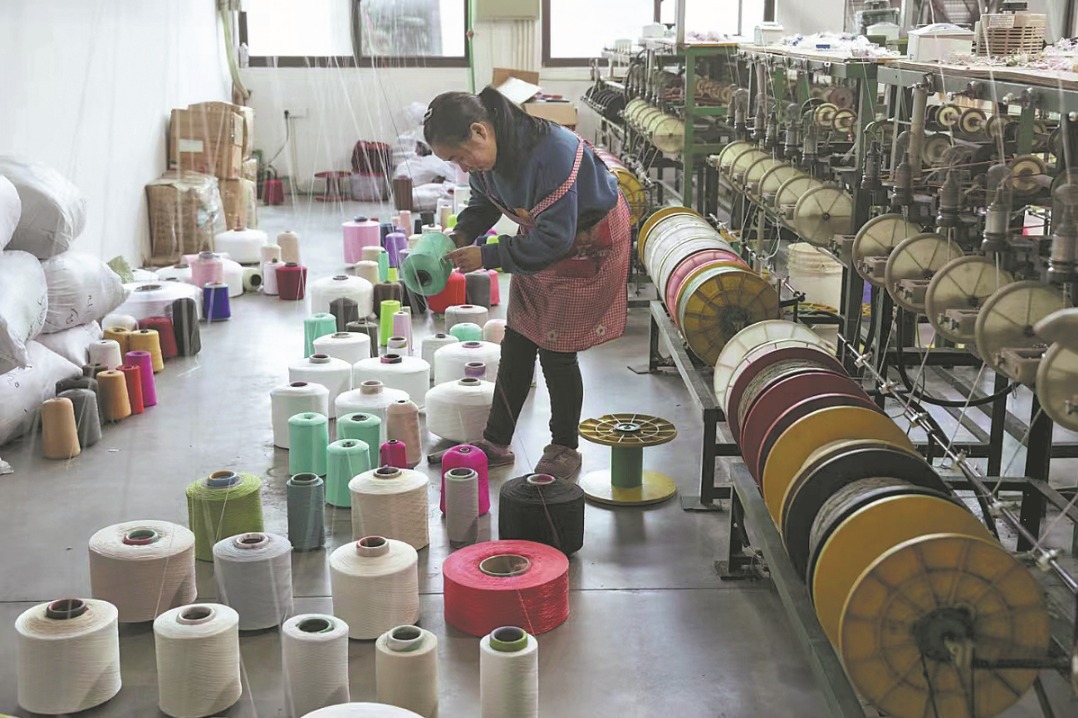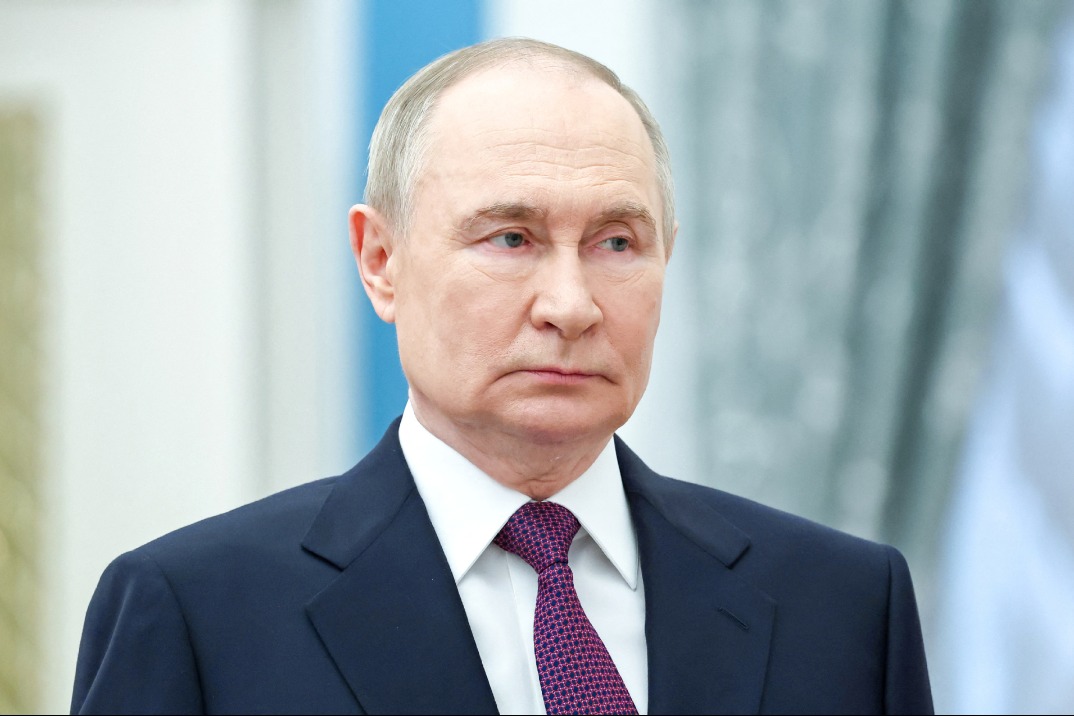The bigger picture

China's burgeoning film industry has set its sights on entertaining world
China, the world's second-largest film market after the United States, has seen a rise in collaboration with the industry in other countries as well as stable development at home.
According to Tong Gang, vice-minister of the State Administration of Press, Publication, Radio, Film and Television, China has seen an average year-on-year growth of around 30 percent at the box office in the past five years.
| China's film industry has witnessed rapid growth over the past few years. (Clockwise from top) Wolf Warrior 2, China's highest-grossing film of all time. The coproductions Great Wall, Wolf Totem, Where Has Time Gone, and Kung Fu Panda 3. Photos Provided to China Daily |
The box office has grown from 17.1 billion yuan ($2.6 billion; 2.2 billion euros; £1.95 billion) in 2012 to 49.2 billion yuan in 2016. The country's movie industry has seen stable development.
Annual theater visits have risen from 466 million in 2012 to 1.37 billion in 2016. And screens in urban areas have increased from 13,118 in 2012 to 41,179 in 2016. The rapid growth has made China one of the most alluring film markets in the world.
Another change is taking place, with a rise in coproductions with other countries.
'Close relations'
Six countries - the record for one year since 2012 - signed film coproduction treaties with China between January and September. That makes for 20 foreign countries to date.
Newcomers include Russia, Brazil, Luxembourg, Kazakhstan, Denmark and Greece.
"The model of coproducing films is developing very well," says Tong.
"Chinese filmmakers have established close relations with Hollywood's major studios. A number of Sino-US film projects are underway."
Miao Xiaotian, general manager of China Film Co-Production Corp, echoes Tong's views.
The company, founded in 1979, is the sole agency authorized by China's top movie regulator to approve coproduction titles.
"The United States is the first and the most active player to explore an effective formula to win Chinese audiences," says Miao.
He says 12 movies, or 16 percent of the 73 approved coproductions last year, are Sino-US projects.
China expanded the annual quota of foreign movies on the basis of sharing box-office revenue from 20 to 34 in 2012.
Coproductions, which are treated like domestic titles and can be released outside of the foreign film's quota policy, have also become a channel for foreign filmmakers to make forays into the Chinese market.
Before 2015, around 40 coproductions were approved each year.
"But 2015 saw a rise to more than 50. That number became 73 in 2016," says Miao.
Such cases include Zhang Yimou's fantasy epic The Great Wall (2016), French director Jean-Jacques Annaud's Wolf Totem (2015), Dream-Works' animated feature Kung Fu Panda 3 (2016) and Lu Chuan's nature film Born in China (2016).
For some Chinese filmmakers, coproducing isn't just about business but also serves as cultural exchange.
Where Has Time Gone, the first coproduction by BRICS countries, which was released in China on Oct 19, exemplifies such an effort.
An anthology of five independent short stories examining the title's theme, the movie has been created by five well-known film directors from China, Russia, Brazil, India and South Africa.
Jia Zhangke has participated in film projects along with filmmakers from South Korea and Switzerland. The BRICS coproduction's executive producer says he is proud to lead the project.
"It gives the Chinese audience an opportunity to discover the cinematic charms of countries that they have limited knowledge about," says Jia, who believes Chinese theaters should not be dominated by Hollywood blockbusters or domestic commercial cinema.
With a number of cash-rich Chinese investors and an expanding population of moviegoers, China has transformed from an "assistant's role" to become an equal collaborator, or even leader, in international co-productions.
Jonathan Shen, founder of the Beijing-based studio Shinework Pictures, is among the latest filmmakers to sense the transformation. Shooting for his company's new movie The Composer has just moved from Almaty, the largest city in Kazakhstan, to Yan'an in Shaanxi province, to film more scenes.
The biopic, based on the true story of Chinese musician Xian Xinghai, is the first Sino-Kazakh film production and includes Kazakhfilm JSC, the country's largest studio, as the partner producer.
Shen says the Kazakh side was very excited upon hearing about the project. The movie brought top Chinese talent and advanced film technology to Kazakhstan.
Screening abroad
A longtime ambition of Chinese filmmakers has been to see the country's films go abroad, and their wish has come true to an extent.
In 2016, overseas revenue from Chinese films hit a record total of 3.83 billion yuan, up by 38 percent from 2015 and more than triple the 2012 figure, according to the country's top regulator of the sector.
A State-backed project called Chinese Films Worldwide Releases has reached major theaters in North America, Europe, Asia and Oceania, says Tong.
Over the next five years, the project will screen 15 domestic hits every year in more than 100 overseas cities and establish a global distribution network for Chinese movies, adds Tong.
In the last two years, Wolf Warrior 2, China's highest-grossing film of all time, and The Monkey King 2, a fantasy epic based on the Chinese classic Journey to the West, did well abroad, too.
Wei Jingyi, vice-president of leading Chinese overseas distributor CMC Pictures, says Wolf Warrior 2 has so far become the most successful Chinese movie in Australia and Singapore, and has been sold to some European countries, such as the Netherlands and Austria, where Chinese movies are rarely screened.
Film festivals have also become pivotal for Chinese movies being shown abroad.
Around 390 Chinese film festivals and events have been held overseas in the past five years. Chinese films have won 552 international awards over the past half decade, earning their stars, directors and producers more attention in the world.
But the biggest challenge seemingly still comes from Hollywood.
"Some reports show that US films dominated 67.4 percent of the global market last year, and the figure for European movies was 26.7 percent," says Vice-Minister Tong.
"Chinese filmmakers need to make more movies that appeal to Western audiences and market them well."
xufan@chinadaily.com.cn
(China Daily Africa Weekly 10/20/2017 page22)
Today's Top News
- EU has much to learn from China-Global South ties
- Xi holds phone conversation with Merz
- Xi stresses high-quality cultural-ethical advancement
- Trump halts Harvard's intl student enrollment
- Xi's visit gives impetus to our work
- Financing support enhanced for micro, small companies































